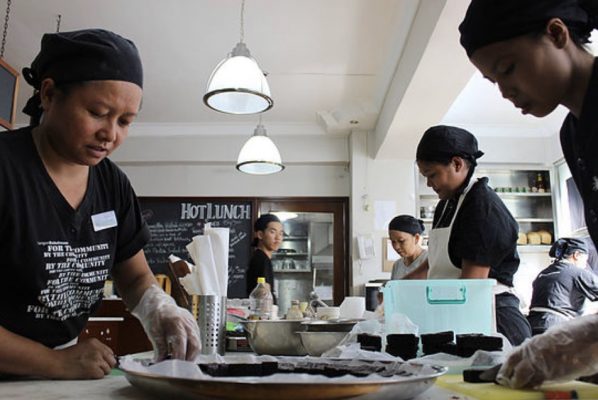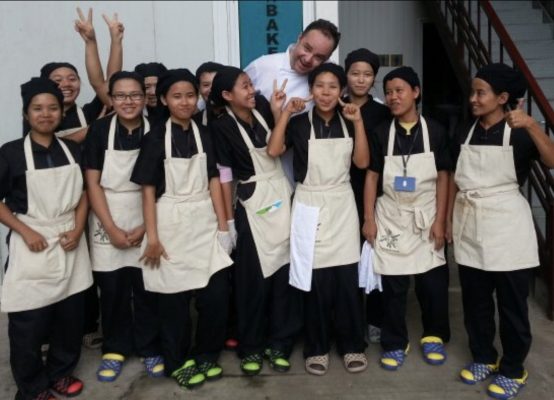By Kayla Vestergaard
Although Myanmar is emerging as one of Southeast Asia’s fastest growing economies, Burmese women are struggling to gain wealth at the pace of men because of social norms of domesticity. As of 2014, only 50% of working age women (15+ years) were in the labor force, compared to 85% of working age men (Centre for Economic and Social Development). In the Burmese city of Yangon, which has a population over 5 million, a bakery and apprenticeship program stands out for empowering local women.
At Yangon Bakehouse, women take job and life skills training to become leaders in their families and communities. The free classes are 7 months long, with the only requirement being a commitment to working in the food and beverage sector post-graduation for at least 12 months. The training’s first three months are dedicated to life skills such as personal hygiene, cancer awareness, maternal and child health, and childcare. The next four are spent having the women practice their kitchen skills by cooking and baking the wide variety of food that contributes to the non-proft’s income generating activities. Eventually, all of this training proves fruitful, with graduates achieving an impressive 500% increase in earning power. Post-graduation, the women are either matched with jobs in the formal food and beverage sector or given resources to begin their own food microenterprises.

Yangon Bakehouse pays for its training courses with income from the bakery, catering, partnerships with NGOs, and donations. A newer training program called “EmpowerAbility” focuses on women with disabilities. With its local partners, it aims to raise $40,000 by July to cover the costs of specialized curriculum and other resources. The idea began in reaction to a 2017 Census report that highlighted the vicious cyclical relationship of disability and poverty. Those with disabilities are far less likely to attend school as children, and this lack of education prevents them from upward economic mobility later in life. For Burmese 15-19 year olds with disabilities, illiteracy rates are nearly 60%, more than 10 times higher than the 5.6% of able-bodied teens. Adding to the education barrier, women with disabilities are particularly at risk for discrimination, sexual abuse, neglect, and exploitation. The standard classes already incorporate protective lessons on gender-based violence and sexism, but EmpowerAbility will need to have a more intense focus.

For every woman trained at Yangon Bakehouse, 5 more people are directly bettered. One could argue additional members of the community are bettered, too, by the delicious food. Reviews rave: with a strong 4.5 stars on Trip Advisor and 164 reviews, it’s clear the products are creative and priced competitively. Customers emphasize the bakehouse is “on another level,” with one calling the staff “beyond wonderful.” In addition to providing sweet and savory food and rich cups of coffee, the staff learns to cater and create elaborate custom cakes. For 50,000 mmk (about $33 USD), customers can choose from cakes such as a 9” rainbow 7 layer cake, a vegan chocolate and vanilla checkerboard cake, or 8 different kinds of cheesecake, among others.
Over 100 women have so far been trained to do dignified work in the formal food and beverage sector. Due to the ripple effects of shared knowledge and profitable skills, an estimated 600 people in total have been positively impacted. So go visit, if you can, to taste the strawberry scones and chocolate pinwheels that are the signs of a sweet headstart.


